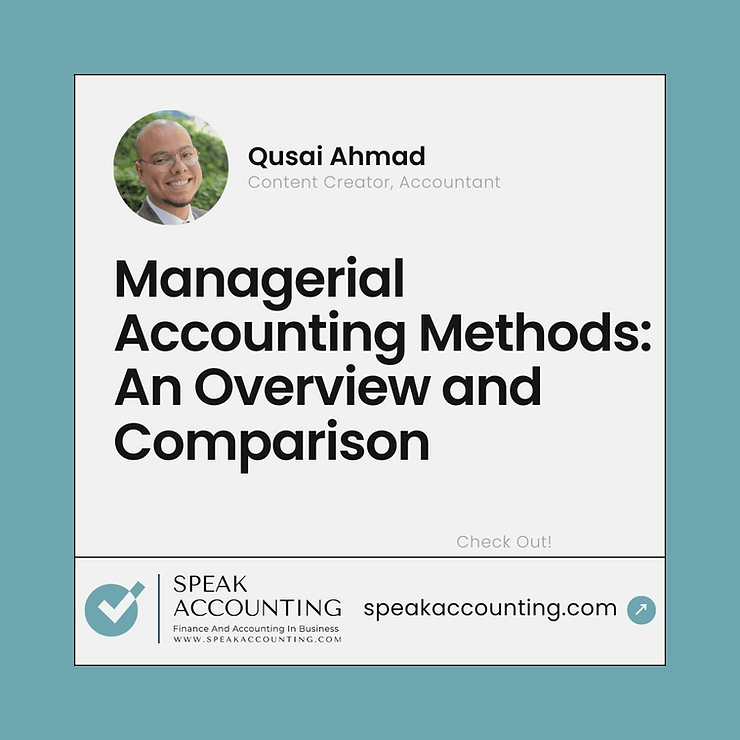Managerial accounting is the process of measuring, analyzing, and reporting financial and non-financial information that helps managers make decisions to fulfill the goals of an organization. Managerial accounting is also known as cost accounting, management accounting, or internal accounting.
Unlike financial accounting, which is mainly concerned with preparing external reports for investors, creditors, regulators, and other stakeholders, managerial accounting focuses on providing useful information for internal users, such as managers, employees, owners, and directors.
One of the main objectives of managerial accounting is to help managers plan, control, and evaluate the performance of various activities, processes, products, services, and segments within the organization. To achieve this, managerial accounting relies on a set of principles that guide the design and implementation of accounting systems and methods.
In this blog post, we will discuss the four main principles of managerial accounting and how they can help you improve your managerial skills and decision-making abilities.
What You Will Learn
By reading this blog post, you will learn:
- The definition and purpose of the four main principles of managerial accounting: cost principle, matching principle, revenue recognition principle, and full disclosure principle.
- The benefits and challenges of applying these principles in different situations and contexts.
- The best practices and tips for using these principles effectively and efficiently.
The Four Main Principles of Managerial Accounting
The four main principles of managerial accounting are:
- Cost principle: This principle states that all costs incurred to generate revenue should be recorded and reported in the same period as the revenue. This principle ensures that the income statement reflects the true profitability of the organization and its activities. The cost principle also helps managers to monitor and control the costs of various resources, such as materials, labor, overhead, and capital.
- Matching principle: This principle states that the expenses incurred to produce or deliver a product or service should be matched with the revenue generated from that product or service. This principle ensures that the income statement reflects the true cost of goods sold and gross margin of the organization and its products or services. The matching principle also helps managers to evaluate the profitability and efficiency of different products, services, segments, and processes.
- Revenue recognition principle: This principle states that revenue should be recognized and recorded when it is earned, not when it is received. This principle ensures that the income statement reflects the true timing and amount of revenue of the organization and its activities. The revenue recognition principle also helps managers to forecast and plan the cash flow and working capital of the organization.
- Full disclosure principle: This principle states that all relevant and material information that affects the financial statements should be disclosed and reported to the users. This principle ensures that the financial statements are transparent, reliable, and comparable for the users. The full disclosure principle also helps managers to communicate and justify their decisions and actions to the stakeholders.
Benefits and Challenges of Applying the Managerial Accounting Principles
Applying the managerial accounting principles can bring many benefits to the organization and its managers, such as:
- Improving the quality and accuracy of the financial information and reports.
- Enhancing the decision-making and problem-solving skills of the managers.
- Increasing the accountability and responsibility of the managers and employees.
- Supporting the strategic planning and goal-setting of the organization.
- Facilitating the performance evaluation and feedback of the organization and its activities.
However, applying the managerial accounting principles can also pose some challenges and limitations, such as:
- Requiring a lot of time, effort, and resources to collect, process, and analyze the accounting data and information.
- Involving a lot of assumptions, estimates, and judgments that may affect the validity and reliability of the accounting data and information.
- Creating a trade-off between the relevance and timeliness of the accounting data and information.
- Facing the risk of manipulation, distortion, and bias of the accounting data and information by the managers or employees.
Best Practices and Tips for Using the Managerial Accounting Principles
To use the managerial accounting principles effectively and efficiently, here are some best practices and tips that you can follow:
- Understand the purpose and scope of each principle and how it relates to your specific situation and context.
- Choose the most appropriate and consistent accounting methods and techniques that suit your needs and objectives.
- Use the accounting data and information as a tool, not as a goal, and supplement it with other qualitative and quantitative information and analysis.
- Compare and contrast the accounting data and information with the budget, standards, benchmarks, and industry averages.
- Review and update the accounting data and information regularly and make adjustments as needed.
- Communicate and share the accounting data and information with the relevant users and stakeholders clearly and concisely.
Conclusion
Managerial accounting principles are the foundation of managerial accounting. They provide the guidelines and rules for measuring, analyzing, and reporting the financial and non-financial information that helps managers make decisions to fulfill the goals of an organization.
By applying managerial accounting principles, you can improve your managerial skills and decision-making abilities, as well as the performance and profitability of your organization and its activities.
However, you should also be aware of the benefits and challenges of applying managerial accounting principles, and follow the best practices and tips for using them effectively and efficiently.
We hope that this blog post has helped you understand and appreciate the managerial accounting principles and how they can help you become a better manager. If you have any questions or comments, please feel free to leave them below. Thank you for reading and happy learning!




